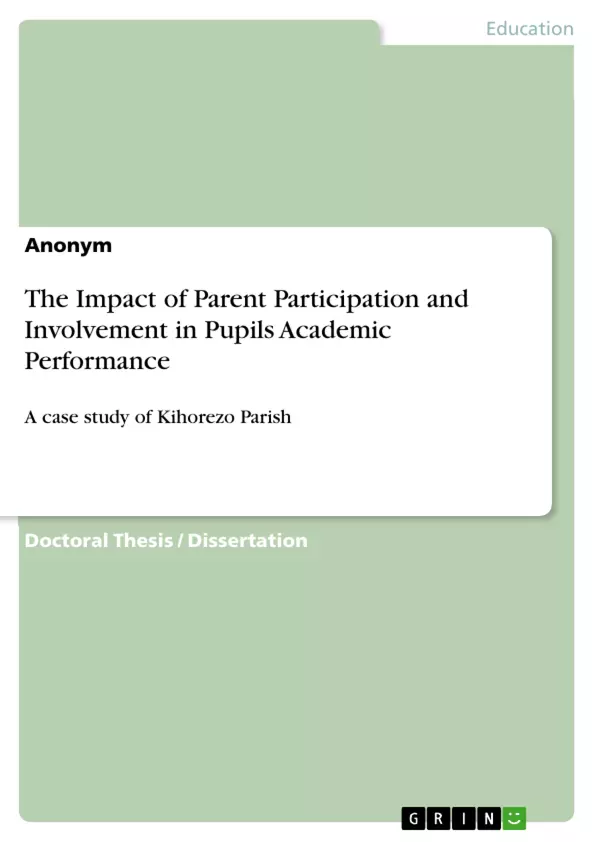The mediating role of parents seems to be having a paramount effect on the child development, child academic performance, child’s aspirations and overall child achievement. Based on the findings of the study, the researcher has been able to identify the effect of parent participation and involvement on the academic performance of their children in primary schools. Some of the required areas that require parents to get involved in include; providing scholastic materials, packing food for lunch, attending school meetings and school days, providing health care , providing safety and security, doing voluntary work at school, assisting in doing homework, providing support to the child and providing life skills among other duties.
Inhaltsverzeichnis (Table of Contents)
- ABSTRACT
- CHAPTER ONE
- 1.0 INTRODUCTION
- 1.1. Background to the study
- 1.2. Statement of the problem
- 1.3. Objectives of the study
- CHAPTER TWO
- 2.1. The effect of regular attendance of school meetings on learners' academic performance in Primary schools
- 2.2. Effects of parents' provision of scholastic materials on academic performance of their children in primary schools
- 2.3. Effects of parents' provision of mid-day meals on academic performance of their children in primary schools
- 2.4. Effects of parents' involvement in facilitating their primary school children's homework on their academic performance
- CHAPTER THREE
- 3.0 Introduction
- 3.1 Research design
- 3.2 Target population
- 3.3 Sample size
- 3.4 Data analysis
- CHAPTER FOUR
- 4.1. The effect of parents, regular attendance of school meetings on learners' academic performance in primary schools
- CHAPTER FIVE
- CHAPTER SIX
- REFERENCES
Zielsetzung und Themenschwerpunkte (Objectives and Key Themes)
This study investigates the impact of parental participation and involvement on pupils' academic performance in primary schools in Kihorezo Parish, Rukiga District, Uganda. The research aims to determine the effect of parental involvement in various aspects of education, including providing scholastic materials, attending school meetings, and assisting with homework. The study seeks to understand how these activities contribute to academic achievement among primary school students.
- The effect of parental involvement on student academic performance.
- The role of parents in providing scholastic materials, attending school meetings, and assisting with homework.
- The importance of parental engagement in ensuring the success of primary education.
- The need for parental education on the significance of their involvement in their children's education.
Zusammenfassung der Kapitel (Chapter Summaries)
- Chapter One: Introduction This chapter provides an overview of the study, highlighting the significance of parental involvement in education. It defines parental involvement and discusses its various forms, including attending school meetings, providing scholastic materials, and assisting with homework. The chapter also reviews previous research on the topic and establishes the problem statement and objectives of the study.
- Chapter Two: Literature Review This chapter explores the existing literature on the relationship between parental involvement and student academic performance. It examines different types of parental involvement, such as attending school events, providing learning materials, and assisting with homework. The chapter analyzes the potential impact of these activities on student learning and academic achievement.
- Chapter Three: Methodology This chapter outlines the research design, target population, sample size, and data analysis methods used in the study. It details the procedures for collecting and analyzing data related to parental involvement and student academic performance.
- Chapter Four: Presentation and Analysis of Findings This chapter presents the results of the study, analyzing the data collected on parental involvement and its impact on student academic performance. It discusses the specific findings regarding the effects of different forms of parental involvement, such as attending school meetings, providing scholastic materials, and assisting with homework.
Schlüsselwörter (Keywords)
The key concepts explored in this study include parental involvement, academic performance, primary education, scholastic materials, school meetings, homework assistance, and student achievement. The research focuses on the impact of parental engagement in various aspects of education and its relationship to student success in primary schools.
Frequently Asked Questions
How does parental involvement affect academic performance?
Parental involvement has a paramount effect on child development and achievement. Activities like providing materials and assisting with homework correlate with better grades.
What are the key areas where parents should be involved?
Key areas include providing scholastic materials, packing lunch, attending school meetings, assisting with homework, and providing health care and security.
Does attending school meetings impact a child's success?
Yes, the study investigates the effect of regular attendance at school meetings, finding it strengthens the relationship between home and school, benefiting the learner.
Why is providing mid-day meals important for education?
The provision of mid-day meals ensures that children have the necessary energy to focus on their studies, directly impacting their academic performance in primary schools.
What was the target population of this study?
The research focused on primary schools in Kihorezo Parish, Rukiga District, Uganda, to understand the local impact of parental engagement.
- Citation du texte
- Anonym (Auteur), 2016, The Impact of Parent Participation and Involvement in Pupils Academic Performance, Munich, GRIN Verlag, https://www.grin.com/document/380762



